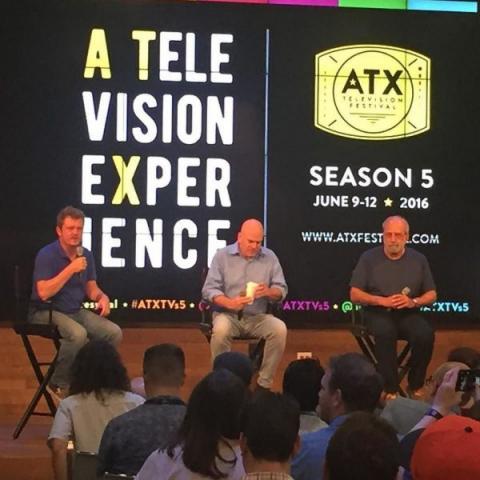tv ATX TV Fest: How HBO’s ‘Oz’ and ‘The Wire’ Changed the Game with David Simon and Tom Fontana
Three showrunners of some of the most influential TV dramas of the so-called golden age of TV shared the stage at the ATX Television Festival Saturday morning at Google Fiber Space, describing the birth of HBO’s original dramas, what it was like to create iconic shows such as “The Wire” and “Homicide: Life on the Street” and why despicable characters still make for great TV.
“House of Cards” creator Beau Willimon moderated the panel which featured “The Wire” creator David Simon and Tom Fontana, who mentored Simon through his transition from newspaper crime reporter to TV writer and show creator. Fontana originated “Homicide” as well as “Oz” for HBO, the network’s first drama in a streak that would continue with “The Sopranos” all the way up to its current behemoth “Game of Thrones.”
For fans unaware of how Simon went from crime reporter to author to TV auteur, it was a good opportunity to get up to speed on how the shows are connected. Simon’s book “Homicide: Life on the Street” let to the NBC TV show run by Fontana. Simon declined to write the pilot episode (“Do you take me for a fool?” he told the network) but eventually came onto the show in its fourth season, writing an award-winning script with David Mills that guest starred Robin Williams.
Fontana said that he initially had no interest in doing a cop show, but that in order to do something like a hospital or police drama, “You really have to blow them up for a new audience,” especially with such easy access to streaming TV today. (Ironically, “Homicide” is a show that’s been difficult to find.)
Fontana went on to create what was up to that point an unsellable prison drama that would become “Oz.” HBO’s then-chief Chris Albrecht bought 13 episodes after seeing a 15-minute test version that, Fontana revealed laughingly, was partly shot with equipment used on “Homicide. “I ended up using NBC’s money,” he laughed. “Oz” turned out to be a gamechanger for Fontana, who found the biggest dramatic change was not having to deal with commercial breaks.
Eventually the panel got to “The Wire,” Simon’s seminal Baltimore drama about why institutions fail us, which followed a six-episode miniseries, “The Corner.” He says that “The Wire” was more influenced by “Oz,” than “The Sopranos,” which had not yet aired when he began working on it.
“The Wire” was never a hit on HBO; is had perpetual low ratings that dipped in the third season, but was kept on the air, subsidized by the success of “Sopranos” and other shows including “Sex and the City.” Willimon described it as “The Velvet Underground of TV,” a series that only caught on long after it had concluded.
Simon and Fontana said that the anything-goes ethos of HBO quickly went away after their biggest hits. “Success breeds fear as much as failure does,” Fontana said, with the network trying to replicate the “Sopranos” formula with diminishing returns. (At least until “Game of Thrones.” About Simon’s excellent, little-watched miniseries about housing segregation “Show Me A Hero” from last year, Fontana joked, “I told him to put a dragon in it, but he didn’t listen.”)
During a brief Q&A Willimon described his characters on “House of Cards” as despicable characters you somehow still root for and that are very fun to write, while Simon addressed a question about which death was hardest emotionally to write. “Wallace’s death on ‘The Wire,’ was the most upsetting,” he said, referring to Michael B. Jordan’s character. “He was beloved by the crew. Grips were saying, ‘You can’t kill Wallace. What kind of asshole kills Wallace?’ ”
Simon noted that the star of “Creed” has gone on to have a pretty great career despite it.


Spread the word